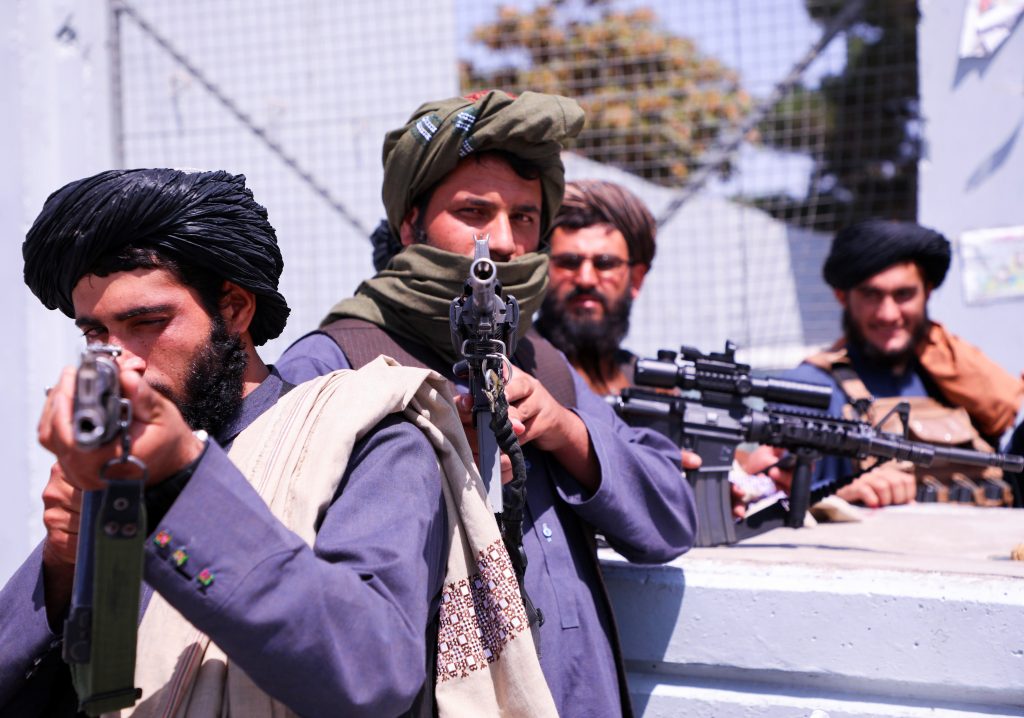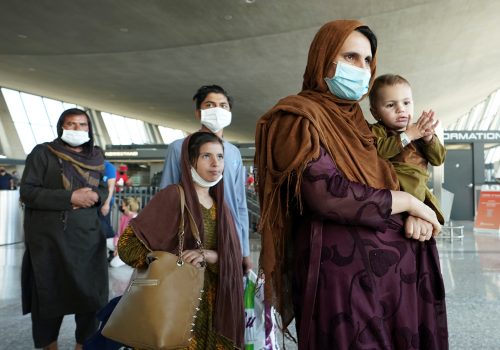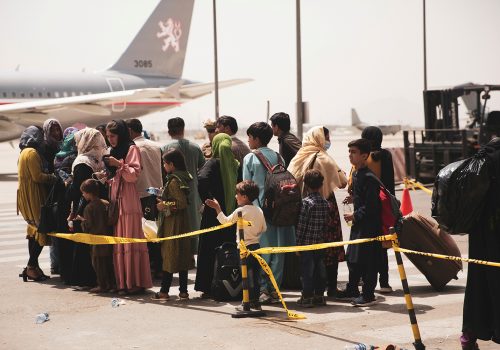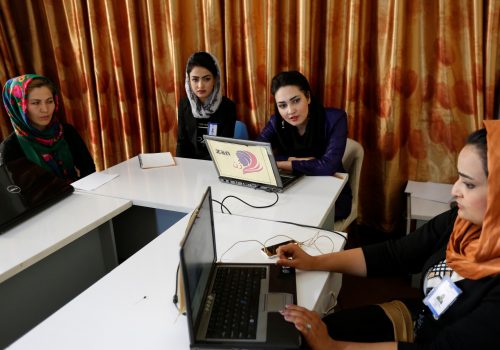On August 18, Ajmal Ahmadi, the former governor of Afghanistan’s Central Bank (DAB), tweeted about the bank’s balance sheet, citing that all DAB assets are safeguarded in the US Federal Reserve, the World Bank, and the Bank of International Settlements in the form of US Treasury bills, bonds, gold and cash–a total of $9.6 billion that, just one day before the collapse, the US government had frozen and banned from all financial transactions. Likewise, the International Monetary Fund (IMF) had frozen their Afghanistan account and halted a COVID-19 relief package. As of now, the Taliban may have access to $100 to $200 million dollars in public funds.
The Afghani—the currency of Afghanistan—depreciated nearly twenty percent the day Kabul collapsed. Though this deprecation corrected itself, the Afghani is still a very fragile currency, and Afghanistan’s economy is in free fall mode due the following factors:
- The Taliban has not yet gained full military control of Afghanistan. Many special forces are in the Panjshir Valley, an area of particular importance to the group for its location vis-à-vis Kabul as it represents a bastion of resistance against Taliban. There, with their armored military equipment, a military battle between the Taliban and Afghan special forces continues and casualties on both sides are substantial. The uncertainty of the country’s political and economic future may hinge on what happens in the Panjshir Valley as the Taliban continue to amass their forces to secure the province.
- The DAB had chronic and substantial challenges over the last twenty years with dysfunctional monetary policy and a failure to manage liquidity, credit, and inflation. The bank, as a first and last resort in market intervention, was selling the DAB’s foreign reserves, mainly United States Dollar and the Euro, to manage Afghani depreciation. The DAB has injected over $700 million in foreign reserves during 2021 to stabilize the market, which demonstrably failed.
- The DAB, despite being over one hundred years old, has no functional securities system for credit management. This failure is owed to the former republic embodied by President Ashraf Ghani as well as Afghanistan’s international allies, who could not build a functioning bond market for active circulation of cash, assets, and securities.
- The DAB suffers from a limited number of staff who understand how the securities and commodity markets work and therefore park their cash in international banks. There is no, or very limited, government insurance available to provide risk management tools for investors. Finally, dependency on foreign aid and access to easy money reduced incentives for Bank leadership to look for sustainable programs.
- Afghanistan is a cash market. Only 16% of the population uses a bank account and, with the current credit crunch due to international sanctions on the Taliban, it is more practical not to have a bank account at this point in Afghanistan.
- The Taliban, with their harsh and dogmatic interpretation of government and politics, is unlikely to adopt modern banking, specifically conventional fixed interest rate-driven markets. Even if they do, the recent two appointments in the Ministry of Finance—Acting Minister of Finance Mullah Hedaytullah Badri and Acting Central Bank Governor Haji Mohammad Idrees—are clear indications of an utter lack of capacity in leading Afghanistan’s finance to the next level as well as saving the Afghanistan economy from free fall. These two individuals are ghost characters. No one knows who they are, what level of education they bring, and the unknowns about their backgrounds in banking and finances are particularly problematic.
- The Taliban’s war campaign has been financed and backed by regional Islamic and non-Islamic states. Pakistan and Iran, for instance, both Islamic states, maintain very active relations with Taliban leaders. Most Taliban senior leadership resides in Pakistan and travel with Pakistani passports. Pakistan also hosts numerous Taliban military camps and has long been a supporter of the Taliban and other Islamic groups. Osama Bin Laden was arrested and killed in Pakistan in the vicinity of the Pakistan Military Academy. Pakistan air force choppers and bombing drones reportedly assisted the Taliban offense in Panjshir, which indicates that Pakistan is actively working to secure Afghanistan for the Taliban. Although Pakistan is a growing economy, it has substantial challenges of its own. The IMF is dissatisfied with the way the Pakistani government handled the IMF’s loan packages to Pakistan. The country’s ever-increasing population, demand for energy, and Pakistan’s name being discussed as a state sponsor for terrorism pose key challenges for financial and economic growth. Pakistan can provide the Taliban with military backing but does not have the cash and credit to back the Taliban government beyond that sector.
- The Islamic Republic of Iran is the flagship nation supporting Islamist governments in the Middle East and North Africa. Looking only to the Iranian backing of Hezbollah in Lebanon, the Bashar al-Assad government in Syria, Hamas in the Gaza Strip, and the Houthis in Yemen, for example. Iran has traditionally supported Shia political fractions in Afghanistan and may do so in the coming days. The only reason Iran may embed itself with the Taliban, a hyper-conservative Sunni group, is to defeat the Unites States and their allies in Afghanistan and further humiliate Washington’s botched withdrawal from Afghanistan. The US withdrawal was completed on August 31, and Iran is under great financial sanctions by the United States. It is thus unlikely to finance and continue to support the Taliban in the near future. Iran needs Afghanistan as a great consumer market and import partner only.
- The second largest economy in the world, China, offers deep pockets of cash and is a major prospective financer for Taliban leaders. Mullah Baradar, currently nominated as deputy prime minister of the Taliban’s Emirate, met Chinese officials in July. Taliban spokespersons have repeatedly announced hope for a strong Taliban-Chinese relationship, however, there are a number of key problems that will prevent a successful marriage between China and the Taliban:
- The Chinese province of Xinjiang, with its predominantly Uyghur Muslim population, remains a huge controversy. Xinjiang Internment camps have been filled with Muslims since 2018 and are a part of its “people’s war on terror,” a policy announced in 2014. The camps have been criticized by numerous governments across the world for alleged human rights abuses, including mistreatment, rape, and torture.
- The Taliban are not welcomed by the majority of Afghan citizens in major cities. They are hyper-conservative and rural while people in major cities have changed and urbanized in the last twenty years of international engagement. Recent protests in the streets of Kabul, Mazar, Herat, Jalalabad, and Kandahar are clear indications of the significant challenges the Taliban faces. China wants a quiet Afghanistan to pursue the expansion of the BRI (Belt and Road Initiative), which would link China to Iran and the Middle East via Afghanistan. This goal seems unrealistic with only the Taliban onboard and a population in open protest against the new government.
- According to the US Geological Survey, Afghanistan has untapped mineral resources which could reach $1 trillion to $3 trillion. China certainly has an eye to these resources. The Taliban—which consists of one ethnic group with a very harsh religious believe system—is unlikely to succeed in securing Afghanistan completely in the days and months to come. As such, China’s potential investment or exploitation of its mineral sector is impractical without a secure and stable Afghanistan.
- Finally, Chinese loan packages for the development of infrastructure projects—which have failed in so many other countries due to high interest rates—will not work in Afghanistan, due to a lack of return feasibility and political instability.
- These factors support the notion that the China and Taliban relationship will always stay surface-level and will not evolve into a deeper one.
Traditionally, military groups transform into governments when they control the geography, but in today’s world, this is a different story. The Taliban cannot be recognized by the United States and other countries if they continue to exclude women from socio-economic and political life. Therefore, the Taliban may have had momentary success in taking over the geography of Afghanistan, but the group will fail in establishing a functioning government if they continue to exclude gender, ethnic, and religious groups. There is no major ethnic group in Afghanistan, for it is a country of minorities. Inclusive participation of all ethnic groups is thus the only practical way to form a government in Afghanistan. Inclusivity will be maintained via public participation in the political decision-making process.
In conclusion, to save Afghanistan, the Taliban should stop the war in Panjshir. A United Nations (UN) intervention could set the stage for an inclusive government in Afghanistan that would ensure political rights and participation for all as well as prevent Afghanistan’s economy from total collapse. This is the best-case solution, but it is unlikely. The alternative is the continuation of violence by the Taliban and spreading of the Panjshir resistance to the rest of Afghanistan. The flames of the civil war backed by regional countries will burn everything Afghanistan has built in the last twenty years.
Farshid Hakimyar was born and raised in Afghanistan. He has worked with governments, not- for-profits, research groups and policy institutions over the last 15 years in both Afghanistan and the United States. He is CEO of Snow Leopard Traders LLC; a firm invest and trade on global macro finance. He founded the firm in 2016.

The South Asia Center is the hub for the Atlantic Council’s analysis of the political, social, geographical, and cultural diversity of the region. At the intersection of South Asia and its geopolitics, SAC cultivates dialogue to shape policy and forge ties between the region and the global community.
Related Content
Image: Taliban forces stand guard in front of Hamid Karzai International Airport in Kabul, Afghanistan, September 2, 2021. REUTERS/Stringer



